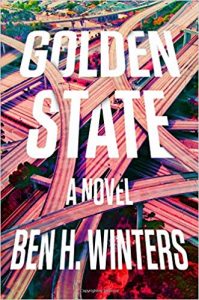Ian Mond and Adrienne Martini Review Golden State by Ben H. Winters
 Golden State, Ben H. Winters (Mulholland Books 978-0-31650-541-3, $28.00, 336pp, hc) January 2019.
Golden State, Ben H. Winters (Mulholland Books 978-0-31650-541-3, $28.00, 336pp, hc) January 2019.
Ben H. Winters’s new novel the Golden State begins with a lovely bit of cognitive dissonance:
This is a novel.
All the words of it are true.
Not only does this pronouncement wrong-foot the reader, echoing Orwell’s clocks striking 13 on a cold April day, but it also establishes a tension between fact and fiction that will have a profound effect on our hero Laszlo Ratesic. When we first meet Laszlo he’s at a local café, about to enjoy his breakfast, when he registers a falsehood, “a small dissonance in the air – the barest ripple, the softest whisper.” As an officer of the Speculative Service, charged with protecting the “Objectively So” from “purposeful distortion[s] of the truth,” he has no choice but to forego his food and arrest the offender. Annoyed at missing out on breakfast – Laszlo loves a good meal – he returns to the office only to discover that his boss has lumped him with a partner, a rookie who needs to be shown the ropes. Her name is Aysa Paige, and she is confident, passionate, and eager to learn. They’re immediately ordered to investigate the death of a labourer who fell off a roof. Initially, it’s not clear why they’ve been asked to attend the scene, as the death appears accidental. However, when they visit the dead man’s house they find that his Day Book – the diary all citizens keep to verify their daily activity against the public record – has been tampered with. Ratesic also discovers another item that shakes him to the core. Slid between the covers of Past is Prologue – the true, albeit heavily redacted, history of the Golden State – is an impossible artefact, a work of fiction.
I’m generally not keen on speculative fiction that explores the current moment by flipping the paradigm. The genre is littered with examples, often sexist or racist, where a marginalised group is given “power” over their oppressors. These ill-conceived thought experiments often beg the question, the conclusion baked into the world-building. Golden State potentially faces the same issue, in as much as it’s self-evident that a society where the truth is mandated by Law and where fiction, creativity, and the imagination are either banned or heavily regulated would be an awful place to live. Yet it’s apparent from the outset that Winters has taken great care fashioning a reality with texture and depth. To achieve the Objectively So, the State relies on mass surveillance, or “captures,” which record every square inch, but there are also these wonderful epistemological flourishes, such as people greeting each other by stating a verifiable immutable fact, and citizens, en masse, calling out the time when the clock hits the hour. We also get a glimpse of the enormous bureaucracy – far more extensive than just the Speculative Service – that administers, maintains, and ensures adherence to the truth. What adds that final coat of authenticity, what makes this feel like a lived world, is that we see everything through the eyes of a man who takes for granted the peculiarities of his society, who never doubts for a moment the morality of imprisoning people who make false claims or exiling those who have lost their grip on reality.
Given the locked-down, regulated nature of Winters’s world, I can’t say I was surprised when Laszlo and Aysa uncover a conspiracy that threatens to undermine their society’s conception of the absolute truth. As Laszlo digs deeper into the convoluted scheme to alter reality – one that at times stretches credulity – his sense of self begins to crumble. Laszlo’s existential crisis cleverly echoes our own current state of confusion where our recognition of what’s true and what’s not has been blurred by an epidemic of “fake news,” instigated chiefly by the current President of the United States. The world Golden State portrays, despite being meticulously thought through, is never sold to us as a viable alternative. Instead, it confirms what we already suspect, something philosophers like Plato understood thousands of years ago: our reality will always be filtered, translated, and interpreted through our subjective experiences. And while those in power might leverage off this limitation in our make-up, Golden State inspires us to imagine a future where fact and fiction live side by side and where we’re smart enough, mature enough to appreciate the difference.
–Ian Mond
Ben Winters’s writing just keeps getting better and better – and it started out pretty dang good to begin with. His Last Policeman trilogy plumbed what could happen when you know the world around you is about to be destroyed by a meteor. His Underground Airlines, about a US where slavery never ended, topped the “best of” lists in 2016. His newest, Golden State, should do the same.
Like the titles that came before it, Golden State is focused on a law enforcement officer who is confronted with a mystery, and, also like the titles that came before it, Golden State is a remarkable blend of detective tropes, solid worldbuilding, humor, and heart. From there, the similarities fade.
Laszlo Ratesic, an officer in the Speculative Service, starts his morning in a diner, in Golden State, a place like our Southern California, but with one huge difference: lying is illegal. Ratesic feels a lie occur in the restaurant – the “dissonance a shimmer on the scene” – pulls the offending group into his office, and kicks off the day that will change everything.
What’s most amazing about Golden State is how many balls Winters keeps in the air simultaneously. There’s Ratesic’s overarching mystery, natch. There’s a love story. And there’s a world that has been meticulously crafted, from the way Golden Staters greet each other by stating facts like:
“Water is made of two hydrogens, one oxygen.”
“Light is faster than sound.”
To the layered manner in which records are kept and worshipped.
But the most impressive aloft ball might be Winters’s seamlessly integrated commentary about the times in which we actually live. The Golden State was formed after a calamity, one that destroyed a civilization in which,
They lied and they didn’t just lie; they built around themselves whole carapaces of alternative truths in which to live like beetles. They built realities and sheltered inside them.
Yet Winters never lets the reader forget that the act of fiction is one big lie, even if it is a lie told in pursuit of a larger truth. All of those layers only add to the satisfying thrum of Ratesic’s story itself, one in which a rule-loving man finds himself in his own calamity.
–Adrienne Martini
Adrienne Martini has been reading or writing about science fiction for decades and has had two non-fiction, non-genre books published by Simon and Schuster. She lives in Upstate New York with one husband, two kids, and one corgi. She also runs a lot.
This review and more like it in the April 2019 issue of Locus.
 While you are here, please take a moment to support Locus with a one-time or recurring donation. We rely on reader donations to keep the magazine and site going, and would like to keep the site paywall free, but WE NEED YOUR FINANCIAL SUPPORT to continue quality coverage of the science fiction and fantasy field.
While you are here, please take a moment to support Locus with a one-time or recurring donation. We rely on reader donations to keep the magazine and site going, and would like to keep the site paywall free, but WE NEED YOUR FINANCIAL SUPPORT to continue quality coverage of the science fiction and fantasy field.







